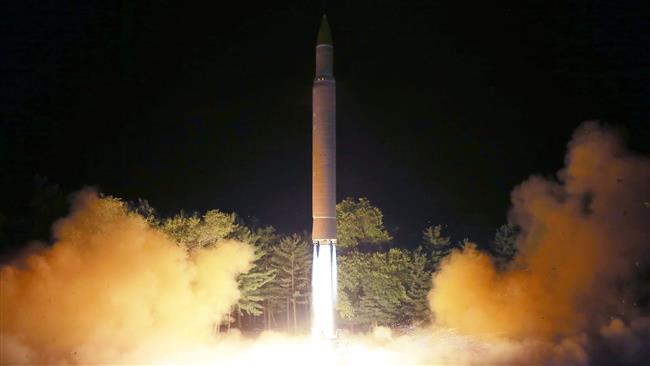North Korea has touted its recent test of Intercontinental Ballistic Missile (ICBM) as a call on the United States to set aside its threats of attacking the island nation.
North Korea's foreign ministry said in a statement on Sunday that the test late Friday was meant to remind the US that it should "wake up from the foolish dream of doing any harm" to the country.
The statement said that the test was "justified" in light of increasing threats by US President Donald Trump against the North, saying the anti-North campaign has persuaded Pyongyang to maintain its weapons programs.
Hours before the test, Trump bashed China for backtracking on its promises of containing North Korea. Trump warned that he would not allow Beijing, an ally of Pyongyang, to "do nothing" about the issue.
The test also came apparently in response to the ratification of sanctions on North Korea in the US Congress.
The statement, carried by the state-run KCNA, said US should stop its policy of piling pressure on Pyongyang.
"The... test-fire of ICBM... this time is meant to send a stern warning to the U.S. making senseless remarks, being lost to reason in the frantic sanctions and pressure campaign against the DPRK," said the statement, using an acronym for North Korea's official name.

This July 28, 2017 picture released from North Korea's official Korean Central News Agency (KCNA) on July 29, 2017 shows North Korea's intercontinental ballistic missile (ICBM), Hwasong-14 being launched at an undisclosed place in North Korea. (AFP photo)
The North also warned that the country will not remain silent in the face of US threats and that a counter-strike would be possible if Washington provokes Pyongyang militarily.
"If the Yankees... dares brandish the nuclear stick on this land again...the DPRK will clearly teach them manners with the nuclear strategic force," it said.
The ICBM test on Friday was the second in less than a month by the North. Experts said the test showed that the North was now capable of targeting the mainland US. North Korea's leader Kim Jong-un has boasted after the test that the "entire mainland US" is now within the range of his military's ballistic missiles. However, there are still suspicions about Pyongyang's ability to miniaturize a nuclear weapon to fit a missile nose cone and other technical issues still remain in doubt.
Since coming to power in 2011, Kim has fast-tracked his country's program for reaching missile and nuclear advancement. That has prompted more international sanctions on the country with two of them last year significantly toughening the sanctions regime.
LINK: https://www.ansarpress.com/english/7738
TAGS:































 online news tv
online news tv




